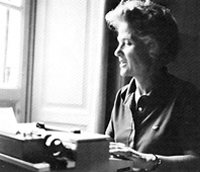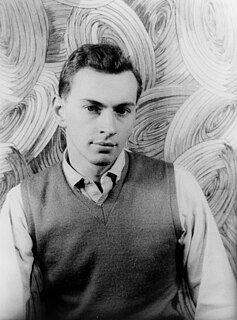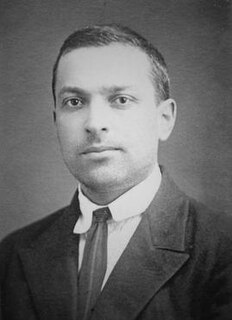 W
WArmen Avanessian is an Austrian philosopher, literary theorist, and political theorist. He has taught at the Free University of Berlin, among other institutions, and held fellowships in the German departments of Columbia University and Yale University. His work on Speculative realism and Accelerationism in art and philosophy has found a wide audience beyond academia.
 W
WMushtaq Ahmed Azmi, was a mass literacy expert. He was one of the first non-officials to be associated with the development of Adult Education program in India from the early 1950s, and was an early leader of the mass literacy movement. As an officer of UNESCO, he was posted in Africa and seconded to lead mass literacy programs in Nigeria and Zambia. He was offered a position in the UNESCO by the British diplomat and head of fundamental education at UNESCO John Bowers.
 W
WJames Benjamin Blish was an American science fiction and fantasy writer. He is best known for his Cities in Flight novels, and his series of Star Trek novelizations written with his wife, J. A. Lawrence. He is credited with creating the term "gas giant" to refer to large planetary bodies.
 W
WJan Blommaert was a Belgian sociolinguist and linguistic anthropologist, Professor of Language, Culture and Globalization and Director of the Babylon Center at Tilburg University, the Netherlands. He also held appointments at Ghent University (Belgium) and University of the Western Cape. He was considered to be one of the world's most prominent sociolinguists and linguistic anthropologists, who had contributed substantially to sociolinguistic globalization theory that focuses on historical as well as contemporary patterns of the spread of languages and forms of literacy, and on lasting and new forms of inequality emerging from globalization processes.
 W
WRay Douglas Bradbury was an American author and screenwriter. One of the most celebrated 20th-century American writers, he worked in a variety of modes, including fantasy, science fiction, horror, mystery, and realistic fiction.
 W
WSamuel Taylor Coleridge was an English poet, literary critic, philosopher and theologian who, with his friend William Wordsworth, was a founder of the Romantic Movement in England and a member of the Lake Poets. He also shared volumes and collaborated with Charles Lamb, Robert Southey, and Charles Lloyd. He wrote the poems The Rime of the Ancient Mariner and Kubla Khan, as well as the major prose work Biographia Literaria. His critical work, especially on William Shakespeare, was highly influential, and he helped introduce German idealist philosophy to English-speaking culture. Coleridge coined many familiar words and phrases, including "suspension of disbelief". He had a major influence on Ralph Waldo Emerson and American transcendentalism.
 W
WGilles Deleuze was a French philosopher who, from the early 1950s until his death in 1995, wrote on philosophy, literature, film, and fine art. His most popular works were the two volumes of Capitalism and Schizophrenia: Anti-Oedipus (1972) and A Thousand Plateaus (1980), both co-written with psychoanalyst Félix Guattari. His metaphysical treatise Difference and Repetition (1968) is considered by many scholars to be his magnum opus. An important part of Deleuze's oeuvre is devoted to the reading of other philosophers: the Stoics, Leibniz, Hume, Kant, Nietzsche, and Bergson, with particular influence derived from Spinoza. A. W. Moore, citing Bernard Williams's criteria for a great thinker, ranks Deleuze among the "greatest philosophers". Although he once characterized himself as a "pure metaphysician", his work has influenced a variety of disciplines across the humanities, including philosophy, art, and literary theory, as well as movements such as post-structuralism and postmodernism.
 W
WWilliam James Durant was an American writer, historian, and philosopher. He became best known for his work The Story of Civilization, 11 volumes written in collaboration with his wife, Ariel Durant, and published between 1935 and 1975. He was earlier noted for The Story of Philosophy (1926), described as "a groundbreaking work that helped to popularize philosophy".
 W
WElizabeth Lewisohn Eisenstein was an American historian of the French Revolution and early 19th-century France. She is well known for her work on the history of early printing, writing on the transition in media between the era of 'manuscript culture' and that of 'print culture', as well as the role of the printing press in effecting broad cultural change in Western civilization.
 W
WMarsilio Ficino was an Italian scholar and Catholic priest who was one of the most influential humanist philosophers of the early Italian Renaissance. He was an astrologer, a reviver of Neoplatonism in touch with the major academics of his day, and the first translator of Plato's complete extant works into Latin. His Florentine Academy, an attempt to revive Plato's Academy, influenced the direction and tenor of the Italian Renaissance and the development of European philosophy.
 W
WSir John Rankine Goody (1919–2015) was an English social anthropologist. He was a prominent lecturer at Cambridge University, and was William Wyse Professor of Social Anthropology from 1973 to 1984.
 W
WPierre-Félix Guattari was a French psychotherapist, philosopher, semiologist, activist and screenwriter. He founded both schizoanalysis and ecosophy, and is best known for his intellectual collaborations with Gilles Deleuze, most notably Anti-Oedipus (1972) and A Thousand Plateaus (1980), the two volumes of Capitalism and Schizophrenia.
 W
WEric Alfred Havelock was a British classicist who spent most of his life in Canada and the United States. He was a professor at the University of Toronto and was active in the Canadian socialist movement during the 1930s. In the 1960s and 1970s, he served as chair of the classics departments at both Harvard and Yale. Although he was trained in the turn-of-the-20th-century Oxbridge tradition of classical studies, which saw Greek intellectual history as an unbroken chain of related ideas, Havelock broke radically with his own teachers and proposed an entirely new model for understanding the classical world, based on a sharp division between literature of the 6th and 5th centuries BC on the one hand, and that of the 4th on the other.
 W
WHarold Adams Innis was a Canadian professor of political economy at the University of Toronto and the author of seminal works on media, communication theory, and Canadian economic history. He helped develop the staples thesis, which holds that Canada's culture, political history, and economy have been decisively influenced by the exploitation and export of a series of "staples" such as fur, fish, lumber, wheat, mined metals, and coal. The staple thesis dominated economic history in Canada from the 1930s to 1960s, and continues to be a fundamental part of the Canadian political economic tradition.
 W
WDerrick de Kerckhove is the author of The Skin of Culture and Connected Intelligence and Professor in the Department of French at the University of Toronto, in Toronto, Ontario, Canada. He was the Director of the McLuhan Program in Culture and Technology from 1983 until 2008.
 W
WAlexander Romanovich Luria was a Soviet neuropsychologist, often credited as a father of modern neuropsychological assessment. He developed an extensive and original battery of neuropsychological tests during his clinical work with brain-injured victims of World War II, which are still used in various forms. He made an in-depth analysis of the functioning of various brain regions and integrative processes of the brain in general. Luria's magnum opus, Higher Cortical Functions in Man (1962), is a much-used psychological textbook which has been translated into many languages and which he supplemented with The Working Brain in 1973.
 W
WHerbert Marshall McLuhan was a Canadian philosopher, whose work is among the cornerstones of the study of media theory. Born in Edmonton, Alberta, and raised in Winnipeg, Manitoba, McLuhan studied at the University of Manitoba and the University of Cambridge. He began his teaching career as a professor of English at several universities in the United States and Canada before moving to the University of Toronto in 1946, where he remained for the rest of his life.
 W
WMichel Eyquem de Montaigne, also known as Lord of Montaigne, was one of the most significant philosophers of the French Renaissance. He is known for popularizing the essay as a literary genre. His work is noted for its merging of casual anecdotes and autobiography with intellectual insight. His massive volume Essais contains some of the most influential essays ever written.
 W
WJoyce Carol Oates is an American writer. Oates published her first book in 1963, and has since published 58 novels, a number of plays and novellas, and many volumes of short stories, poetry, and non-fiction. Her novels Black Water (1992), What I Lived For (1994), and Blonde (2000), and her short story collections The Wheel of Love (1970) and Lovely, Dark, Deep: Stories (2014) were each finalists for the Pulitzer Prize. She has won many awards for her writing, including the National Book Award, for her novel them (1969), two O. Henry Awards, the National Humanities Medal, and the Jerusalem Prize (2019).
 W
WWalter Jackson Ong was an American Jesuit priest, professor of English literature, cultural and religious historian, and philosopher. His major interest was in exploring how the transition from orality to literacy influenced culture and changed human consciousness. In 1978 he served as elected president of the Modern Language Association.
 W
WEric Arthur Blair known by his pen name George Orwell, was an English novelist, essayist, journalist and critic. His work is characterised by lucid prose, biting social criticism, total opposition to totalitarianism, and outspoken support of democratic socialism.
 W
WAnthony Trollope was an English novelist and civil servant of the Victorian era. Among his best-known works is a series of novels collectively known as the Chronicles of Barsetshire, which revolves around the imaginary county of Barsetshire. He also wrote novels on political, social, and gender issues, and other topical matters.
 W
WEugene Luther Gore Vidal, better known as Gore Vidal, was an American writer and public intellectual known for his epigrammatic wit, erudition, and patrician manner. Vidal was bisexual, and in his novels and essays interrogated the social and cultural sexual norms he perceived as driving American life. Beyond literature, Vidal was heavily involved in politics. He twice sought office—unsuccessfully—as a Democratic Party candidate, first in 1960 to the United States House of Representatives, and later in 1982 to the U.S. Senate.
 W
WLev Semyonovich Vygotsky was a Soviet psychologist, known for his work on psychological development in children. He published on a diverse range of subjects, and from multiple views as his perspective changed over the years. Among his students was Alexander Luria and Kharkiv school of psychology.
 W
WGeorge Schneiweis Wise was an American sociologist who served as the first president of Tel Aviv University in Ramat Aviv, Israel from 1963 to 1971.